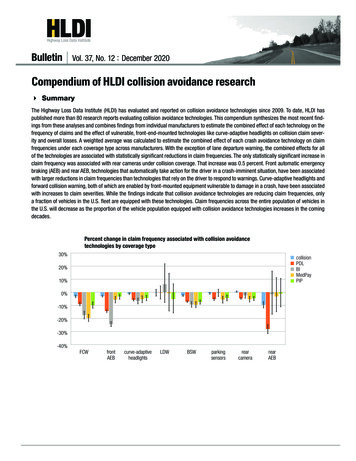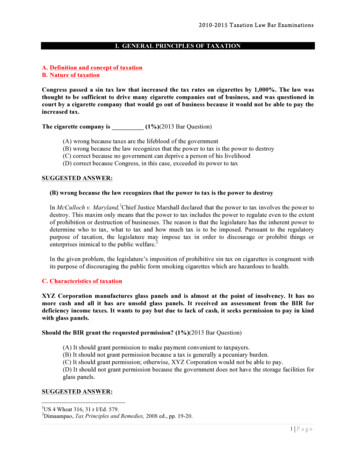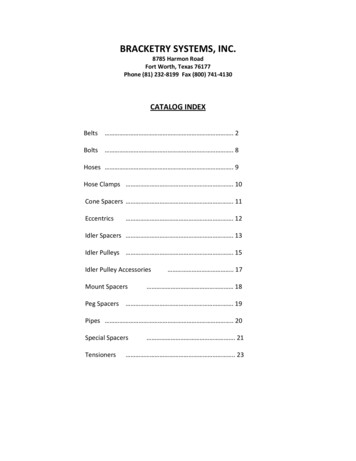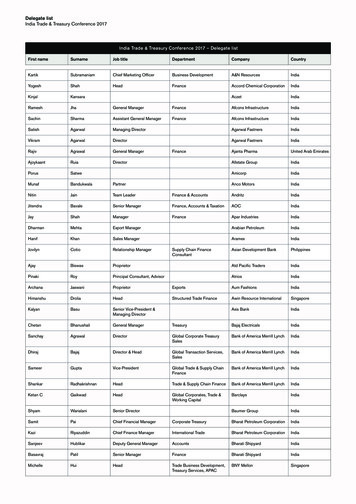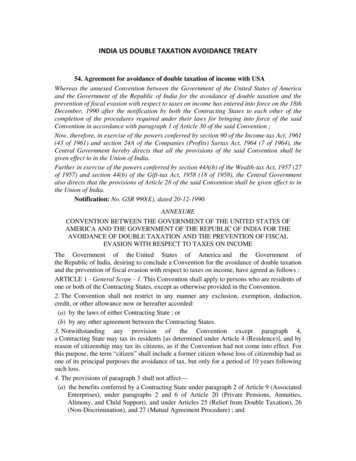
Transcription
INDIA US DOUBLE TAXATION AVOIDANCE TREATY54. Agreement for avoidance of double taxation of income with USAWhereas the annexed Convention between the Government of the United States of Americaand the Government of the Republic of India for the avoidance of double taxation and theprevention of fiscal evasion with respect to taxes on income has entered into force on the 18thDecember, 1990 after the notification by both the Contracting States to each other of thecompletion of the procedures required under their laws for bringing into force of the saidConvention in accordance with paragraph 1 of Article 30 of the said Convention ;Now, therefore, in exercise of the powers conferred by section 90 of the Income-tax Act, 1961(43 of 1961) and section 24A of the Companies (Profits) Surtax Act, 1964 (7 of 1964), theCentral Government hereby directs that all the provisions of the said Convention shall begiven effect to in the Union of India.Further in exercise of the powers conferred by section 44A(b) of the Wealth-tax Act, 1957 (27of 1957) and section 44(b) of the Gift-tax Act, 1958 (18 of 1958), the Central Governmentalso directs that the provisions of Article 28 of the said Convention shall be given effect to inthe Union of India.Notification: No. GSR 990(E), dated 20-12-1990.ANNEXURECONVENTION BETWEEN THE GOVERNMENT OF THE UNITED STATES OFAMERICA AND THE GOVERNMENT OF THE REPUBLIC OF INDIA FOR THEAVOIDANCE OF DOUBLE TAXATION AND THE PREVENTION OF FISCALEVASION WITH RESPECT TO TAXES ON INCOMEThe Government of the United States of America and the Government ofthe Republic of India, desiring to conclude a Convention for the avoidance of double taxationand the prevention of fiscal evasion with respect to taxes on income, have agreed as follows :ARTICLE 1 - General Scope - 1. This Convention shall apply to persons who are residents ofone or both of the Contracting States, except as otherwise provided in the Convention.2. The Convention shall not restrict in any manner any exclusion, exemption, deduction,credit, or other allowance now or hereafter accorded:(a) by the laws of either Contracting State ; or(b) by any other agreement between the Contracting States.3. Notwithstanding any provision of the Convention except paragraph 4,a Contracting State may tax its residents [as determined under Article 4 (Residence)], and byreason of citizenship may tax its citizens, as if the Convention had not come into effect. Forthis purpose, the term “citizen” shall include a former citizen whose loss of citizenship had asone of its principal purposes the avoidance of tax, but only for a period of 10 years followingsuch loss.4. The provisions of paragraph 3 shall not affect—(a) the benefits conferred by a Contracting State under paragraph 2 of Article 9 (AssociatedEnterprises), under paragraphs 2 and 6 of Article 20 (Private Pensions, Annuities,Alimony, and Child Support), and under Articles 25 (Relief from Double Taxation), 26(Non-Discrimination), and 27 (Mutual Agreement Procedure) ; and
(b) the benefits conferred by a Contracting State under Articles 19 (Remuneration andPensions in respect of Government Service), 21 (Payment received by Students andApprentices), 22 (Payments received by Professors, Teachers and Research Scholars)and 29 (Diplomatic Agents and Consular Officers), upon individuals who are neithercitizens of, nor have immigrant status in, that State.ARTICLE 2 - Taxes covered - 1. The existing taxes to which this Convention shall apply are :(a) in the United States, the Federal income taxes imposed by the Internal Revenue Code(but excluding the accumulated earnings tax, the personal holding company tax, andsocial security taxes), and the exercise taxes imposed on insurance premiums paid toforeign insurers and with respect to private foundations (hereinafter referred to as“United States Tax”); provided, however, the Convention shall apply to the exercisetaxes imposed on insurance premiums paid to foreign insurers only to the extent that therisks covered by such premiums are not reinsured with a person not entitled toexemption from such taxes under this or any other Convention which applies to thesetaxes ; and(b) in India :(i) the income-tax including any surcharge thereon, but excluding income-tax onundistributed income of companies, imposed under the Income-tax Act ; and(ii) the surtax(hereinafter referred to as “Indian tax”).Taxes referred to in (a) and (b) above shall not include any amount payable in respect of anydefault or omission in relation to the above taxes or which represent a penalty imposedrelating to those taxes.2. The Convention shall apply also to any identical or substantially similar taxes which areimposed after the date of signature of the Convention in addition to, or in place of, theexisting taxes. The competent authorities of the Contracting States shall notify each other ofany significant changes which have been made in their respective taxation laws and of anyofficial published material concerning the application of the Convention.ARTICLE 3 - General definitions - 1. In this Convention, unless the context otherwiserequires:(a) the term “India” means the territory of India and includes the territorial sea and airspace above it, as well as any other maritime zone in which India has sovereign rights,other rights and jurisdictions, according to the Indian law and in accordance with international law ;(b) the term “United States”, when used in a geographical sense means all the territory ofthe United States of America, including its territorial sea, in which the laws relating toUnited States tax are in force, and all the area beyond its territorial sea, including thesea bed and subsoil thereof, over which the United States has jurisdiction in accordancewith international law and in which the laws relating to United States tax are in force ;(c) the terms “a Contracting State” and “the other Contracting State” mean India or theUnited States as the context requires ;(d) the term “tax” means Indian tax or United States tax, as the context requires ;(e) the term “person” includes an individual, an estate, a trust, a partnership, a company,any other body of persons, or other taxable entity ;(f) the term “company” means any body corporate or any entity which is treated as acompany or body corporate for tax purposes ;
(g) the terms “enterprise of a Contracting State” and “enterprise of the other ContractingState” mean respectively an enterprise carried on by a resident of a Contracting Stateand an enterprise carried on by a resident of the other Contracting State ;(h) the term “competent authority” means, in the case of India, the Central Government inthe Ministry of Finance (Department of Revenue) or their authorised representative, andin the case of the United States, the Secretary of the Treasury or his delegate ;(i) the term “national” means any individual possessing the nationality or citizenship of aContracting State ;(j) the term “international traffic” means any transport by a ship or aircraft operated by anenterprise of a Contracting State, except when the ship or aircraft is operated solelybetween places within the other Contracting State ;(k) the term “taxable year” in relation to Indian tax means “previous year” as defined in theIncome-tax Act, 1961.2. As regards the application of the Convention by a Contracting State any term not definedtherein shall, unless the context otherwise requires or the competent authorities agree to acommon meaning pursuant to the provisions of Article 27 (Mutual Agreement Procedure),have the meaning which it has under the laws of that State concerning the taxes to which theConvention applies.ARTICLE 4 - Residence - 1. For the purposes of this Convention, the term “resident of aContracting State” means any person who, under the laws of that State, is liable to tax thereinby reason of his domicile, residence, citizenship, place of management, place ofincorporation, or any other criterion of a similar nature, provided, however, that(a) this term does not include any person who is liable to tax in that State in respect only ofincome from sources in that State; and(b) in the case of income derived or paid by a partnership, estate, or trust, this term appliesonly to the extent that the income derived by such partnership, estate, or trust is subjectto tax in that State as the income of a resident, either in its hands or in the hands of itspartners or beneficiaries.(2) Where by reason of the provisions of paragraph 1, an individual is a resident of bothContracting States, then his status shall be determined as follows :(a) he shall be deemed to be a resident of the State in which he has a permanent homeavailable to him; if he has a permanent home available to him in both States, he shall bedeemed to be a resident of the State with which his personal and economic relations arecloser (centre of vital interests) ;(b) if the State in which he has his centre of vital interests cannot be determined, or if hedoes not have a permanent home available to him in either State, he shall be deemed tobe a resident of the State in which he has an habitual abode ;(c) if he has an habitual abode in both States or in neither of them, he shall be deemed to bea resident of the State of which he is a national;(d) if he is a national of both States or of neither of them, the competent authorities of theContracting States shall settle the question by mutual agreement.3. Where, by reason of paragraph 1, a company is a resident of both Contracting States, suchcompany shall be considered to be outside the scope of this Convention except for purposesof paragraph 2 of Article 10 (Dividends), Article 26 (Non-Discrimination), Article 27(Mutual Agreement Procedure), Article 28 (Exchange of Information and AdministrativeAssistance) and Article 30 (Entry into Force).
4. Where, by reason of the provisions of paragraph 1, a person other than an individual or acompany is a resident of both Contracting States, the competent authorities of the ContractingStates shall settle the question by mutual agreement and determine the mode of application ofthe Convention to such person.ARTICLE 5 - Permanent establishment - 1. For the purposes of this Convention, the term“permanent establishment” means a fixed place of business through which the business of anenterprise is wholly or partly carried on.2. The term “permanent establishment” includes especially :(a) a place of management ;(b) a branch ;(c) an office ;(d) a factory ;(e) a workshop ;(f) a mine, an oil or gas well, a quarry, or any other place of extraction of naturalresources ;(g) a warehouse, in relation to a person providing storage facilities for others ;(h) a farm, plantation or other place where agriculture, forestry, plantation or relatedactivities are carried on ;(i) a store or premises used as a sales outlet ;(j) an installation or structure used for the exploration or exploitation of natural resources,but only if so used for a period of more than 120 days in any twelve-month period ;(k) a building site or construction, installation or assembly project or supervisory activitiesin connection therewith, where such site, project or activities (together with other suchsites, projects or activities, if any) continue for a period of more than 120 days in anytwelve-month period ;(l) the furnishing of services, other than included services as defined in Article 12(Royalties and Fees for Included Services), within a Contracting State by an enterprisethrough employees or other personnel, but only if:(i) activities of that nature continue within that State for a period or periodsaggregating more than 90 days within any twelve-month period ; or(ii) the services are performed within that State for a related enterprise [within themeaning of paragraph 1 of Article 9 (Associated Enterprises)].3. Notwithstanding the preceding provisions of this Article, the term “permanentestablishment” shall be deemed not to include any one or more of the following :(a) the use of facilities solely for the purpose of storage, display, or occasional delivery ofgoods or merchandise belonging to the enterprise ;(b) the maintenance of a stock of goods or merchandise belonging to the enterprise solelyfor the purpose of storage, display, or occasional delivery ;(c) the maintenance of a stock of goods or merchandise belonging to the enterprise solelyfor the purpose of processing by another enterprise ;(d) the maintenance of a fixed place of business solely for the purpose of purchasing goodsor merchandise, or of collecting information, for the enterprise ;(e) the maintenance of a fixed place of business solely for the purpose of advertising, forthe supply of information, for scientific research or for other activities which have apreparatory or auxiliary character, for the enterprise.
4. Notwithstanding the provisions of paragraphs 1 and 2, where a person—other than anagent of an independent status to whom paragraph 5 applies - is acting in a Contracting Stateon behalf of an enterprise of the other Contracting State, that enterprise shall be deemed tohave a permanent establishment in the first-mentioned State, if :(a) he has and habitually exercises in the first-mentioned State an authority to conclude onbehalf of the enterprise, unless his activities are limited to those mentioned in paragraph3 which, if exercised through a fixed place of business, would not make that fixed placeof business a permanent establishment under the provisions of that paragraph ;(b) he has no such authority but habitually maintains in the first-mentioned State a stock ofgoods or merchandise from which he regularly delivers goods or merchandise on behalfof the enterprise, and some additional activities conducted in the State on behalf of theenterprise have contributed to the sale of the goods or merchandise ; or(c) he habitually secures orders in the first-mentioned State, wholly or almost wholly for theenterprise.5. An enterprise of a Contracting State shall not be deemed to have a permanentestablishment in the other Contracting State merely because it carries on business in thatother State through a broker, general commission agent, or any other agent of an independentstatus, provided that such persons are acting in the ordinary course of their business.However, when the activities of such an agent are devoted wholly or almost wholly on behalfof that enterprise and the transactions between the agent and the enterprise are not madeunder arm’s length conditions, he shall not be considered an agent of independent statuswithin the meaning of this paragraph.6. The fact that a company which is a resident of a Contracting State controls or is controlledby a company which is a resident of the other Contracting State, or which carries on businessin that other State (whether through a permanent establishment or otherwise), shall not ofitself constitute either company a permanent establishment of the other.ARTICLE 6 - Income from immovable property (real property) - 1. Income derived by aresident of a Contracting State from immovable property (real property), including incomefrom agriculture or forestry, situated in the other Contracting State may be taxed in that otherState.2. The term “immovable property” shall have the meaning which it has under the law of theContracting State in which the property in question is situated.3. The provisions of paragraph 1 shall also apply to income derived from the direct use,letting, or use in any other form of immovable property.4. The provisions of paragraphs 1 and 3 shall also apply to the income from immovableproperty of an enterprise and to income from immovable property used for the performanceof independent personal services.ARTICLE 7 - Business profits - 1. The profits of an enterprise of a Contracting State shall betaxable only in that State unless the enterprise carries on business in the other ContractingState through a permanent establishment situated therein. If the enterprise carries on businessas aforesaid, the profits of the enterprise may be taxed in the other State but only so much ofthem as is attributable to (a) that permanent establishment ; (b) sales in the other State ofgoods or merchandise of the same or similar kind as those sold through that permanentestablishment ; or (c) other business activities carried on in the other State of the same orsimilar kind as those effected through that permanent establishment.2. Subject to the provisions of paragraph 3, where an enterprise of a Contracting State carrieson business in the other Contracting State through a permanent establishment situated therein,there shall in each Contracting State be attributed to that permanent establishment the profits
which it might be expected to make if it were a distinct and independent enterprise engagedin the same or similar activities under the same or similar conditions and dealing wholly atarm’s length with the enterprise of which it is a permanent establishment and otherenterprises controlling, controlled by or subject to the same common control as thatenterprise. In any case where the correct amount of profits attributable to a permanentestablishment is incapable of determination or the determination thereof presents exceptionaldifficulties, the profits attributable to the permanent establishment may be estimated on areasonable basis. The estimate adopted shall, however, be such that the result shall be inaccordance with the principles contained in this Article.3. In the determination of the profits of a permanent establishment, there shall be allowed asdeductions expenses which are incurred for the purposes of the business of the permanentestablishment, including a reasonable allocation of executive and general administrativeexpenses, research and development expenses, interest, and other expenses incurred for thepurposes of the enterprise as a whole (or the part thereof which includes the permanentestablishment), whether incurred in the State in which the permanent establishment is situatedor elsewhere, in accordance with the provisions of and subject to the limitations of thetaxation laws of that State. However, no such deduction shall be allowed in respect ofamounts, if any, paid (otherwise than towards reimbursement of actual expenses) by thepermanent establishment to the head office of the enterprise or any of its other offices, byway of royalties, fees or other similar payments in return for the use of patents, know-how orother rights, or by way of commission or other charges for specific services performed or formanagement, or, except in the case of a banking enterprises, by way of interest on moneyslent to the permanent establishment. Likewise, no account shall be taken, in the determinationof the profits of a permanent establishment, for amounts charged (otherwise than towardreimbursement of actual expenses), by the permanent establishment to the head office of theenterprise or any of its other offices, by way of royalties, fees or other similar payments inreturn for the use of patents, know-how or other rights, or by way of commission or othercharges for specific services performed or for management, or, except in the case of abanking enterprise, by way of interest on moneys lent to the head office of the enterprise orany of its other offices.4. No profits shall be attributed to a permanent establishment by reason of the mere purchaseby that permanent establishment of goods or merchandise for the enterprise.5. For the purposes of this Convention, the profits to be attributed to the permanentestablishment as provided in paragraph 1(a) of this Article shall include only the profitsderived from the assets and activities of the permanent establishment and shall be determinedby the same method year by year unless there is good and sufficient reason to the contrary.6. Where profits include items of income which are dealt with separately in other Articles ofthe Convention, then the provisions of those Articles shall not be affected by the provisionsof this Article.7. For the purposes of the Convention, the term “business profits” means income derivedfrom any trade or business including income from the furnishing of services other thanincluded services as defined in Article 12 (Royalties and Fees for Included Services) andincluding income from the rental of tangible personal property other than property describedin paragraph 3(b) of Article 12 (Royalties and Fees for Included Services).ARTICLE 8 - Shipping and air transport - 1. Profits derived by an enterprise of aContracting State from the operation by that enterprise of ships or aircraft in internationaltraffic shall be taxable only in that State.2. For the purposes of this Article, profits from the operation of ships or aircraft ininternational traffic shall mean profits derived by an enterprise described in paragraph 1 from
the transportation by sea or air respectively of passengers, mail, livestock or goods carried onby the owners or lessees or charterers of ships or aircraft including—(a) the sale of tickets for such transportation on behalf of other enterprises;(b) other activity directly connected with such transportation ; and(c) the rental of ships or aircraft incidental to any activity directly connected with suchtransportation.3. Profits of an enterprise of a Contracting State described in paragraph 1 from the use,maintenance, or rental of containers (including trailers, barges, and related equipment for thetransport of containers) used in connection with the operation of ships or aircraft ininternational traffic shall be taxable only in that State.4. The provisions of paragraphs 1 and 3 shall also apply to profits from participation in apool, a joint business, or an international operating agency.5. For the purposes of this Article, interest on funds connected with the operation of ships oraircraft in international traffic shall be regarded as profits derived from the operation of suchships or aircraft, and the provisions of Article 11 (Interest) shall not apply in relation to suchinterest.6. Gains derived by an enterprise of a Contracting State described in paragraph 1 from thealienation of ships, aircraft or containers owned and operated by the enterprise, the incomefrom which is taxable only in that State, shall be taxed only in that State.ARTICLE 9 - Associated enterprises - 1. Where :(a) an enterprise of a Contracting State participates directly or indirectly in themanagement, control or capital of an enterprise of the other Contracting State ; or(b) the same persons participate directly or indirectly in the management, control, or capitalof an enterprise of a Contracting State and an enterprise of the other Contracting State,and in either case conditions are made or imposed between the two enterprises in theircommercial or financial relations which differ from those which would be made betweenindependent enterprises, then any profits which, but for those conditions would have accruedto one of the enterprises, but by reason of those conditions have not so accrued, may beincluded in the profits of that enterprise and taxed accordingly.2. Where a Contracting State includes in the profits of an enterprise of that State, and taxesaccordingly, profits on which an enterprise of the other Contracting State has been charged totax in that other State, and the profits so included are profits which would have accrued to theenterprise of the first-mentioned State if the conditions made between the two enterprises hadbeen those which would have been made between independent enterprises, then that otherState shall make an appropriate adjustment to the amount of the tax charged therein on thoseprofits. In determining such adjustment, due regard shall be had to the other provisions of thisConvention and the competent authorities of the Contracting States shall, if necessary,consult each other.ARTICLE 10 - Dividends - 1. Dividends paid by a company which is a resident of aContracting State to a resident of the other Contracting State may be taxed in that other State.2. However, such dividends may also be taxed in the Contracting State of which the companypaying the dividends is a resident, and according to the laws of that State, but if the beneficialowner of the dividends is a resident of the other Contracting State, the tax so charged shallnot exceed :(a) 15 per cent of the gross amount of the dividends if the beneficial owner is a companywhich owns at least 10 per cent of the voting stock of the company paying the dividends.(b) 25 per cent of the gross amount of the dividends in all other cases.
Sub-paragraph (b) and not sub-paragraph (a) shall apply in the case of dividends paid by aUnited States person which is a Regulated Investment Company. Sub-paragraph (a) shall notapply to dividends paid by a United States person which is a Real Estate Investment Trust,and sub-paragraph (b) shall only apply if the dividend is beneficially owned by an individualholding a less than 10 per cent interest in the Real Estate Investment Trust. This paragraphshall not affect the taxation of the company in respect of the profits out of which thedividends are paid.3. The term “dividends” as used in this Article means income from shares or other rights, notbeing debt-claims, participating in profits, income from other corporate rights which aresubjected to the same taxation treatment as income from shares by the taxation laws of theState of which the company making the distribution is a resident ; and income fromarrangements, including debt obligations, carrying the right to participate in profits, to theextent so characterised under the laws of the Contracting State in which the income arises.4. The provisions of paragraphs 1 and 2 shall not apply if the beneficial owner of thedividends, being a resident of a Contracting State, carries on business in the other ContractingState, of which the company paying the dividends is a resident, through a permanentestablishment situated therein, or performs in that other State independent personal servicesfrom a fixed base situated therein, and the dividends are attributable to such permanentestablishment or fixed base. In such case the provisions of Article 7 (Business Profits) orArticle 15 (Independent Personal Services), as the case may be, shall apply.5. Where a company which is a resident of a Contracting State derives profits or income fromthe other Contracting State, that other State may not impose any tax on the dividends paid bythe company except insofar as such dividends are paid to a resident of that other State orinsofar as the holding in respect of which the dividends are paid is effectively connected witha permanent establishment or a fixed base situated in that other State, nor subject thecompany’s undistributed profits to a tax on the company’s undistributed profits, even if thedividends paid or the undistributed profits consist wholly or partly of profits or incomearising in such other State.ARTICLE 11 - Interest - 1. Interest arising in a Contracting State and paid to a resident of theother Contracting State may be taxed in that other State.2. However, such interest may also be taxed in the Contracting State in which it arises, andaccording to the laws of that State, but if the beneficial owner of the interest is a resident ofthe other Contracting State, the tax so charged shall not exceed :(a) 10 per cent of the gross amount of the interest if such interest is paid on a loan grantedby a bank carrying on a bona fide banking business or by a similar financial institution(including an insurance company) ; and(b) 15 per cent of the gross amount of the interest in all other cases.3. Notwithstanding the provisions of paragraph 2 of this Article, interest arising in aContracting State :(a) and derived and beneficially owned by the Government of the other Contracting State, apolitical sub-division or local authority thereof, the Reserve Bank of India, or theFederal Reserve Bank of the United States, as the case may be, and such otherinstitutions of either Contracting State as the competent authorities may agree pursuantto Article 27 (Mutual Agreement Procedure) ;(b) with respect to loans or credits extended or endorsed(i) by the Export Import Bank of the United States, when India is the first-mentionedContracting State ; and
(ii) by the EXIM Bank of India, when the United States is the first-mentionedContracting State ; and(c) to the extent approved by the Government of that State, and derived and beneficiallyowned by any person, other than a person referred to in sub-paragraphs (a) and (b), whois a resident of the other Contracting State, provided that the transaction giving rise tothe debt-claim has been approved in this behalf by the Government of the firstmentioned Contracting State ;shall be exempt from tax in the first-mentioned Contracting State.4. The term “interest” as used in this Convention means income from debt-claims of everykind, whether or not secured by mortgage, and whether or not carrying a right to participatein the debtor’s profits, and in particular, income from Government securities, and incomefrom bonds or debentures, including premiums or prizes attaching to such securities, bonds,or debentures. Penalty charges for late payment shall not be regarded as interest for thepurposes of the Convention. However, the term “interest” does not include income dealt within Article 10 (Dividends).5. The provisions of paragraphs 2 and 3 shall not apply if the beneficial owner of the interest,being a resident of a Contracting State, carries on business in the other Contracting State inwhich the interest arises, through a permanent establishment situated therein, or performs inthat other State independent personal services from a fixed base situated therein, and theinterest is attributable to such permanent establishment or fixed base. In such case theprovisions of
54. Agreement for avoidance of double taxation of income with USA Whereas the annexed Convention between the Government of the United States of America and the Government of the Republic of India for the avoidance of double taxation and the prevention of fiscal evasion with respect to taxes on income has entered into force on the 18th

